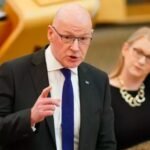Glasgow City Council is struggling to balance its budget for the next three years, as it faces a massive funding gap of over £100 million. The council has proposed a series of measures to reduce its spending and increase its income, including a 5% rise in council tax, cuts to museum and library opening hours, higher nursery fees, and more fines for parking and bus lane violations. However, these measures have sparked protests and criticisms from opposition parties, trade unions, and community groups, who say they will hit the poorest and most vulnerable residents the hardest.
Council tax increase and service cuts
The council’s budget for 2023-24, which was agreed on Thursday 16 February 2023, aims to meet a funding gap of £49.3 million in the new financial year. The council says this gap is caused by the reduction in the amount of money set aside for local government by the Scottish Government, and the decline in the share of that national budget that is allocated to Glasgow. The council also expects to face a cumulative shortfall of £120 million over the next three years, which it describes as “extremely challenging”.
To balance the budget, the council has decided to increase the council tax by 5%, which will generate an extra £15.7 million. This means that the average Band D household will pay an additional £67.32 per year. The council says this increase is necessary to protect and maintain the services that the communities depend on, and that it is still below the Scottish average.

However, the council tax hike will not be enough to cover the funding gap, and the council will also have to make cuts and savings worth £31.2 million, and use another £6 million from its General Fund balances. Some of the services that will be affected by these measures are:
- Glasgow Life, the charity that runs the city’s cultural and leisure facilities, will have to raise £7.15 million by reducing the opening hours of swimming pools, health suites, the Mitchell Library, and outdoor tennis courts, as well as charging a fee to enter the glasshouse in the Botanic Gardens, including the Kibble Palace.
- Nursery fees over the 1140 free hours will increase by 3%, and schools will see their non-teacher resource budgets cut by around 10%.
- Allotment charges will rise by 50%, and a permit will be required for garden waste collection in the brown bins.
- Burial and cremation charges will go up by 3%, and parking and bus lane fines will increase by 10%, raising £3 million.
- The cleansing budget will be cut by almost £1 million, with a review of kerbside collections, but no changes to the green general waste bins.
Protests and criticisms
The council’s budget has been met with strong opposition from various groups, who claim that it will have a negative impact on the quality of life and the wellbeing of the people of Glasgow, especially the low-income and disadvantaged groups.
The Labour group, which is the main opposition party in the council, did not take part in the budget vote, and accused the SNP administration of “failing to stand up for Glasgow”. The Labour leader, Councillor Frank McAveety, said that the council tax rise was “unfair and unjust”, and that the service cuts were “deep and damaging”. He also blamed the Scottish Government for underfunding the local authorities, and called for a fairer funding formula.
The Green and Tory groups also left the chamber before the decision was taken, and expressed their dissatisfaction with the budget. The Green leader, Councillor Kim Long, said that the budget was “a missed opportunity to invest in a green and fair recovery” from the pandemic, and that the council should have used more of its reserves and borrowing powers to avoid service cuts. The Tory leader, Councillor Thomas Kerr, said that the budget was “a betrayal of the people of Glasgow”, and that the council should have focused on efficiency savings and income generation, rather than tax hikes and service reductions.
The trade unions and the community groups also staged protests outside the City Chambers, and demanded more funding and support for the public services and the workers. The Unison branch secretary, Brian Smith, said that the budget was “a disaster for Glasgow”, and that it would lead to job losses, reduced services, and increased poverty and inequality. He also urged the council and the Scottish Government to work together to find a better solution. The Glasgow People’s Budget campaign, which represents over 40 community organisations, said that the budget was “a slap in the face for the people of Glasgow”, and that it would worsen the social and environmental problems in the city. They also called for more democratic participation and consultation in the budget process.
Council’s response
The council’s leader, Councillor Susan Aitken, defended the budget, and said that it was “the best possible outcome” given the circumstances. She said that the council had tried to protect the frontline services and the most vulnerable people, and that it had invested in the city’s recovery and regeneration. She also said that the council had no choice but to increase the council tax, as it was the only source of income that the council had control over. She said that the council tax rise was “modest and reasonable”, and that it was still lower than many other councils in Scotland.
She also rejected the criticisms from the opposition parties, and said that they had failed to offer any credible alternatives or solutions. She said that the Labour group had “abdicated their responsibility” by not taking part in the vote, and that they had “no vision or ambition” for the city. She also said that the Green and Tory groups had “walked away” from the debate, and that they had “no credibility or influence” in the council. She said that the SNP administration was “the only party that was serious about governing Glasgow”, and that it had “a clear plan and a strong record” of delivering for the city.
She also challenged the Scottish Government to provide more funding and flexibility for the local authorities, and said that the current system was “not fit for purpose”. She said that the council needed “a fairer share of the national budget”, and “more powers and autonomy” to raise and spend its own money. She said that the council was “ready and willing” to work with the Scottish Government and the other councils to reform the local government finance, and to create “a new deal for Glasgow and for Scotland”.


















